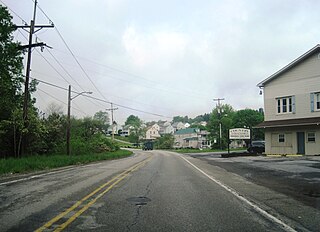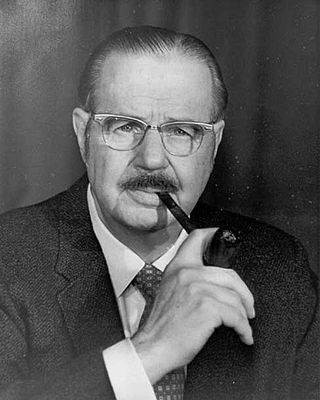
Jerome is a census-designated place (CDP) in Somerset County, Pennsylvania. The population was 779 as of 2010. It is part of the Johnstown, Pennsylvania, Metropolitan Statistical Area. Jerome is part of the municipality of Conemaugh Township, Somerset County, Pennsylvania, as are the nearby towns of Davidsville, Thomas Mills, Tire Hill, Seanor, Hiyasota and part of Holsopple.

The United Mine Workers of America is a North American labor union best known for representing coal miners. Today, the Union also represents health care workers, truck drivers, manufacturing workers and public employees in the United States and Canada. Although its main focus has always been on workers and their rights, the UMW of today also advocates for better roads, schools, and universal health care. By 2014, coal mining had largely shifted to open pit mines in Wyoming, and there were only 60,000 active coal miners. The UMW was left with 35,000 members, of whom 20,000 were coal miners, chiefly in underground mines in Kentucky and West Virginia. However it was responsible for pensions and medical benefits for 40,000 retired miners, and for 50,000 spouses and dependents.

Michael Angelo Musmanno was an American jurist, politician, and naval officer. Coming from an immigrant family, he started to work as a coal loader at the age of 14. After serving in the United States Army in World War I, he obtained a law degree from Georgetown University. For nearly two decades from the early 1930s, he served as a judge in courts of Allegheny County, Pennsylvania. Entering the U.S. Navy during World War II, he served in the military justice system.
The Coal and Iron Police (C&I) was a private police force in the US state of Pennsylvania that existed between 1865 and 1931. It was established by the Pennsylvania General Assembly but employed and paid for by the various coal companies. The Coal and Iron Police worked alongside the Pennsylvania National Guard, and later the Pennsylvania State Police, beginning in 1877. The remaining Coal and Iron Police commissions were allowed to expire in 1931, ostensibly ending the state-sanctioned organization of a private police force. Industrial policing continued in limited form until the later 1930s, when the National Labor Relations Act, the Fair Labor Standards Act and other federal legislation made armed industrial force illegal.

Pittsburgh is a 1942 American drama film directed by Lewis Seiler and starring Marlene Dietrich, Randolph Scott, and John Wayne. Based on a story by George Owen and Tom Reed, the film is about an ambitious coal miner who values wealth and power in the Pittsburgh steel industry over his friends, lovers, and ideals, only to find himself deserted and alone at the top. When his fortune crumbles around him, he discovers that fate offers him an unexpected second chance. Filmed partially on location in Pittsburgh, Pennsylvania, the film co-stars Shemp Howard of Three Stooges fame in a rare dramatic role. Dietrich, Scott, and Wayne also made The Spoilers together that same year. Scott received top billing over Wayne in both films despite the fact that Wayne's roles were larger and more important.

Alexander Kelly was an African-American coal miner and native of Pennsylvania who fought with the Union Army as a member of the 6th United States Colored Infantry Regiment during the American Civil War. He was awarded his nation's highest military decoration—the U.S. Medal of Honor—for his gallantry in the Battle of Chaffin's Farm, Virginia on September 29, 1864.
The Westmoreland County coal strike of 1910–1911, or the Westmoreland coal miners' strike, was a strike by coal miners represented by the United Mine Workers of America. The strike is also known as the Slovak Strike because about 70 percent of the miners were Slovak immigrants. It began in Westmoreland County, Pennsylvania, on March 9, 1910, and ended on July 1, 1911. At its height, the strike encompassed 65 mines and 15,000 coal miners. Sixteen people were killed during the strike, nearly all of them striking miners or members of their families. The strike ended in defeat for the union.

Black Fury is a 1935 American crime film directed by Michael Curtiz, and starring Paul Muni, Karen Morley, and William Gargan. It was adapted by Abem Finkel and Carl Erickson from the short story "Jan Volkanik" by Judge Michael A. Musmanno, and the play Bohunk by Harry R. Irving. The plot is based on a historic incident during a Pennsylvania walk-out in 1929, in which John Barkowski, a striking coal miner, was beaten to death by private company police.
John Barcoski was a Polish émigré miner brutally beaten to death by Pennsylvania's Coal and Iron Police on February 10, 1929. His passing and subsequent acquittal of his murderers on the first-degree murder charges provoked public indignation, which eventually led to the end of Pennsylvania's private anti-labor Coal and Iron Police system.

Joey's Case is a crime novel by the American writer K. C. Constantine set in 1980s Rocksburg, a fictional, blue-collar, Rust Belt town in Western Pennsylvania, modeled on the author's hometown of McKees Rocks, Pennsylvania, adjacent to Pittsburgh.

Goldsborough is a proletarian novel by the German-American writer Stefan Heym.
Horning is a neighborhood in the borough of Baldwin in Allegheny County, Pennsylvania, United States. It was the residence of miners of the Pittsburgh Terminal Railroad and Coal Company #4 Mine, which had a racially integrated workforce, unusual in that era.
John L. Musmanno is a senior judge of the Pennsylvania Superior Court.

The Manchester Bridge, also known as the North Side Point Bridge, was a steel Pratt truss bridge that spanned the Allegheny River in Pittsburgh, Pennsylvania.
The Harwick Mine disaster was a mining accident on January 25, 1904 in Cheswick, Pennsylvania, some sixteen mi (26 km) north of Pittsburgh in the western part of the state. The blast killed an estimated 179 miners and 2 aid workers. The disaster ranks among the ten worst coal mining disasters in American history. One community especially impacted was the Hungarian community in Homestead, Pennsylvania. Fifty-eight of the members of the First Hungarian Reformed Church of Homestead—a full third of the congregation—died in the explosion.

The 1964 United States Senate election in Pennsylvania was held on November 3, 1964. Incumbent Republican U.S. Senator Hugh Scott successfully sought re-election to another term, defeating Democratic nominee Genevieve Blatt.
The 1927 Indiana bituminous strike was a strike by members of the United Mine Workers of America (UMWA) against local bituminous coal companies. Although the struggle raged throughout most of the nation's coal fields, its most serious impact was in western Pennsylvania, including Indiana County. The strike began on April 1, 1927, when almost 200,000 coal miners struck the coal mining companies operating in the Central Competitive Field, after the two sides could not reach an agreement on pay rates. The UMWA was attempting to retain pay raises gained in the contracts it had negotiated in 1922 and 1924, while management, stating that it was under economic pressure from competition with the West Virginia coal mines, was seeking wage reductions. The strike proved to be a disaster for the union, as by 1929, there were only 84,000 paying members of the union, down from 400,000 which belonged to the union in 1920.

The Scranton general strike was a widespread work stoppage in 1877 by workers in Scranton, Pennsylvania, which took place as part of the Great Railroad Strike, and was the last in a number of violent outbreaks across Pennsylvania. The strike began on July 23 when railroad workers walked off the job in protest of recent wage cuts, and within three days it grew to include perhaps thousands of workers from a variety of industries.











